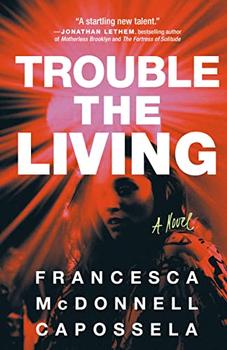Summary | Excerpt | Reading Guide | Discuss | Reviews | Beyond the Book | Readalikes | Genres & Themes | Author Bio

A Novel
by Francesca McDonnell CaposselaChapter One
1997, County Tyrone, Northern Ireland
On the first sunny day in April, when the world smelled as clean as water tastes, Ma took us to see the border.
"No boys allowed," she said, closing the door of the blue station wagon in our brother Tad's face. She had told Ina and me that we were going shopping for the wedding. In the back seat, Ina wore a bright-yellow turtleneck, her hair pinned like a halo on top of her head. She had a pimple below her left nostril; in every other regard, she was perfect.
On the motorway, Ma drove quickly. I rolled down my window and dangled my wrist out, catching the wind. She kept her gaze on the road, her body still despite the speed, but I had the feeling she was watching me.
We drove on back roads until I was sure we were not, after all, going dress shopping, until I became entirely disoriented as to our location. Only then did Ma pull onto a spot of grass and park the car by a stream. The sun was strong even though it was not warm. I opened the car door and turned my body toward the outdoors.
"Where are we?" Ina asked.
Ma got out of the car slowly, her body tensed. She was wearing black suit trousers, a white blouse, and, over it all, a long, black leather coat. In the mud, she stood in boots with three-inch heels. She towered. Ina and I followed.
We stood in the clearing, three women in boots and coats, and Ina and I looked around to see what made this spot more important than the shopping center.
"That's the border," Ma said. Her pointer finger arced in the sky, following the water until she landed on a birch tree. "Until there." The stream went north; the border went east.
"Do you see it?" she asked.
We shook our heads.
"That's because it isn't real," she said. "They drew a line on a map, and they want us to live by it."
It was not the first time I had seen the border. Not the first time I had crossed it. But it was the first time I had seen a slice of it that was not swarming with Brits. This was the border's naked underbelly, what it looked like without its armor. She was showing us its weak spots, the places where we could do damage.
We stood still, three points on a triangle, looking up at the gray-blue sky. The trees above us reached, as if to grasp each other. There was a hole between them, a space where no branches loomed. After a minute, I took off my boots.
The water was icy on my ankles. The rocks slipped under my feet. I walked in the stream up to the birch tree, stepped onto the grass, and kept walking. Trying to feel the line beneath my feet, the evidence of separation.
I looked back at my mother. There was a white scar across her stomach, hidden now beneath her blouse. The scar was raised, like braille, and it marked the place where she'd been opened when she gave birth to Ina. When it was still red and I was very small, she wouldn't let me see it. She said that that kind of pain hurt to look at. But when it healed, and only the white road of it remained, I would trace my fingers across it, the sewn-up severing of her. If she hadn't been a mother, I thought, she would have been a soldier. I saw it in her straight back, her set jaw.
"Don't tell your da," Ma said as she started the car again, her hand on the gearshift knotted and tense with her power, the machine that she controlled, the weight she wielded. "And don't tell your brothers. Girls understand these things much better than fellas."
We nodded. It did not have to be said. We did not speak of scars with our father. But we felt them, Ina and I. In different ways, we felt them.
In the morning, I woke with Ma beside me in bed. Her stomach was hot on my lower back, the tuck of her knees into the backs of mine. She always slept like that, curled into herself. They must have fought again.
Outside the window, the morning was dark, except for the ribbons of pink closest to the horizon. Even with Ma beside me, I was cold. It was the time of thawing, the steady climb toward Easter. Fish and vegetables for dinner every night. All of us waiting for Him to die, to be reborn.
Excerpted from Trouble the Living by Francesca McDonnell Capossela. Copyright © 2023 by Francesca McDonnell Capossela. Excerpted by permission of Lake Union Publishing. All rights reserved. No part of this excerpt may be reproduced or reprinted without permission in writing from the publisher.




Courage - a perfect sensibility of the measure of danger, and a mental willingness to endure it.
Click Here to find out who said this, as well as discovering other famous literary quotes!
Your guide toexceptional books
BookBrowse seeks out and recommends the best in contemporary fiction and nonfiction—books that not only engage and entertain but also deepen our understanding of ourselves and the world around us.